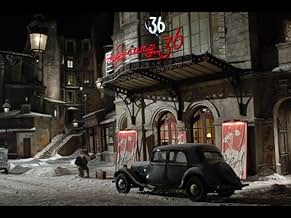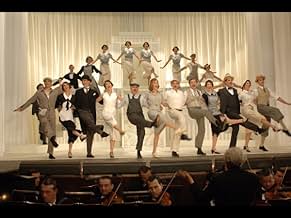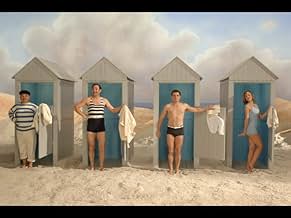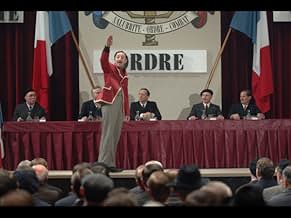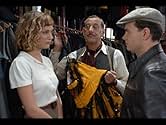AVALIAÇÃO DA IMDb
6,5/10
3 mil
SUA AVALIAÇÃO
Adicionar um enredo no seu idiomaWhen Chansonia, a nightclub, is shut down by the landlord, the stage manager Pigoil is forced to look for a new job. He finds hope when he discovers a young woman with a lovely singing voice... Ler tudoWhen Chansonia, a nightclub, is shut down by the landlord, the stage manager Pigoil is forced to look for a new job. He finds hope when he discovers a young woman with a lovely singing voice.When Chansonia, a nightclub, is shut down by the landlord, the stage manager Pigoil is forced to look for a new job. He finds hope when he discovers a young woman with a lovely singing voice.
- Direção
- Roteiristas
- Artistas
- Indicado a 1 Oscar
- 3 vitórias e 7 indicações no total
Avaliações em destaque
I loved it! Boz Luhrmann meets Cinema Paradiso in numerous ways. The plot is simple, as others here have already described. But it retains an abundance of charm. The undercurrents of antisemitism and fascism that were persistent in 1936 France are themes rarely seen on screen. Ditto for the Communist workers' movement during the same time. The clashes between these two groups were inevitable, and this film depicts that struggle brilliantly, without preaching to us or hitting us over the head with it. All the acting, singing and dancing are extremely well-done, and the cinematography, while Luhrmann-esquire is engaging. Best of all perhaps is the music. This film is destined to be a classic, and will always be on my favorites list. The only thing I would change is that I would retain the original title. The audience for this film is sophisticated enough to handle it.
This is not a great film, a masterpiece of cinema-as-art. It is, however, a wonderful movie that will delight you while you watch it and leave you with many happy musical memories after it has finished.
Though the director and star are the same, this movie does not resemble Les Choristes. It is, instead, an homage to French popular music of the 1930s (and 1940s). If you don't know that music and the stars who made it famous, you'll miss the many references. The movie will still be enjoyable, but it won't evoke the memories (and pleasures) that it would to French viewers over 60.
The music, most of it original, nevertheless comes very close to pastiche of popular numbers from that era. (One repeated number is very close to Messager's "Clou clou," which I think is from his Véronique.) The performances and characters also allude to stars of the past, though not necessarily in a one-on-one way. There is the music hall singer Tony Rossignol, whose light lyric tenor recalls Tino Rossi, though his Spanish get-up and music recalls Luis Mariano. Kad Merad's character starts out doing terrible impressions, of animals and Fernandel. He finally has a hit when he starts singing like Charles Trenet. Even though the music is pastiche, it is sometimes very catchy, and very much caught me up.
One of the previous reviewers said that Clovis Cornilliac was made up as Jean Gabin but couldn't reproduce the latter's charisma. I hope he was not meant to recall Gabin, because he certainly doesn't. He's pleasant in his role, as is the female lead, but the star is definitely Gerard Jugniot, who gives yet another first-rate performance.
This won't make the viewing list for any course on French cinema, nor should it. But you'll definitely enjoy it.
P.S. I watched this movie again, about a year after my first viewing of it. While I still found it enjoyable, I realize, in rereading my review, that it was the last part, with all the music, that made the strong impression on me. One of the reviews written since my first one notes that the movie might have been more memorable if there had been more music spread throughout it, and I agree. The show the company originally stages is bad vaudeville, and bad vaudeville numbers have only limited appeal. The subplot concerning Galapiat and the French fascists is somehow disconnected from the rest. Having subsequently seen that same actor, Bernard-Pierre Donnadieu, in L'affaire Salengro, where he played someone on the other side of that fight, I realize how much better the issue could have been presented.
The film is definitely worth watching, and should please most viewers. Gérard Jugnot gives yet another very fine, very moving performance. I don't know how well it will repay repeated viewings, however. I don't know if I would want to watch it myself a third time.
Though the director and star are the same, this movie does not resemble Les Choristes. It is, instead, an homage to French popular music of the 1930s (and 1940s). If you don't know that music and the stars who made it famous, you'll miss the many references. The movie will still be enjoyable, but it won't evoke the memories (and pleasures) that it would to French viewers over 60.
The music, most of it original, nevertheless comes very close to pastiche of popular numbers from that era. (One repeated number is very close to Messager's "Clou clou," which I think is from his Véronique.) The performances and characters also allude to stars of the past, though not necessarily in a one-on-one way. There is the music hall singer Tony Rossignol, whose light lyric tenor recalls Tino Rossi, though his Spanish get-up and music recalls Luis Mariano. Kad Merad's character starts out doing terrible impressions, of animals and Fernandel. He finally has a hit when he starts singing like Charles Trenet. Even though the music is pastiche, it is sometimes very catchy, and very much caught me up.
One of the previous reviewers said that Clovis Cornilliac was made up as Jean Gabin but couldn't reproduce the latter's charisma. I hope he was not meant to recall Gabin, because he certainly doesn't. He's pleasant in his role, as is the female lead, but the star is definitely Gerard Jugniot, who gives yet another first-rate performance.
This won't make the viewing list for any course on French cinema, nor should it. But you'll definitely enjoy it.
P.S. I watched this movie again, about a year after my first viewing of it. While I still found it enjoyable, I realize, in rereading my review, that it was the last part, with all the music, that made the strong impression on me. One of the reviews written since my first one notes that the movie might have been more memorable if there had been more music spread throughout it, and I agree. The show the company originally stages is bad vaudeville, and bad vaudeville numbers have only limited appeal. The subplot concerning Galapiat and the French fascists is somehow disconnected from the rest. Having subsequently seen that same actor, Bernard-Pierre Donnadieu, in L'affaire Salengro, where he played someone on the other side of that fight, I realize how much better the issue could have been presented.
The film is definitely worth watching, and should please most viewers. Gérard Jugnot gives yet another very fine, very moving performance. I don't know how well it will repay repeated viewings, however. I don't know if I would want to watch it myself a third time.
Nora Arnezeder reminds me of movie stars of the thirties : beautiful, charming, she can sing, dance, act... Star quality ! As for the film itself, the story is rather simple, which I come to realize, is often what makes it good. It's not so much what the story is about but rather how you tell it. And in that case, you get to laugh, cry, you care about that Pigoil who looses his job, his wife and even his son and who doesn't lose hope, about Milou and Douce's love story. You'll love the great new songs, the homage to Busby Berkeley, Jacky's lousy jokes (a reprise of Kad's own TV skit) and secondary characters played by first-rate comedians like François Morel and the great Pierre Richard. What's not to like ?
Go to IMDb.com and enter the title: "Paris 36" and what do you get?... VOILA! "Faubourg 36"! Therein lies the problem: Apparently, someone set out to make one movie...and ended up making a completely different one! This bizarre Paris/Faubourg dichotomy plagues the movie throughout, but particularly during the last half!
"Paris" did, however, get off to a relatively good start...Showing a lot of promise, in a number of different areas: The inter-action between lead characters seemed brisk and focused; the sets had a very authentic mid-30's Paris look and feel; Music that had just the right mix of melancholy, nostalgia and pre-war glibness and sung with just the right inflection and ring; and different back stories...But it all started sputtering about half way through. The last half was a total mess. Absolutely nothing worked! I can't imagine what was going though Writer/Director Christophe Barratier's mind, as he pressed on with this project!
As "Paris" progressed, the characters' actions became constantly more erratic, unpredictable and demonstrated a continually escalating degree of incongruity with the personality and motives of each character. Protagonists capriciously waltzed in and out of the movie, with little or no explanation. Because of this, the last half of "Paris" takes on a dues ex machine tainted storyline much more akin to a fairy tale or the romantic daydreams of a 14 year-old Parisian girl. 2**
"Paris" did, however, get off to a relatively good start...Showing a lot of promise, in a number of different areas: The inter-action between lead characters seemed brisk and focused; the sets had a very authentic mid-30's Paris look and feel; Music that had just the right mix of melancholy, nostalgia and pre-war glibness and sung with just the right inflection and ring; and different back stories...But it all started sputtering about half way through. The last half was a total mess. Absolutely nothing worked! I can't imagine what was going though Writer/Director Christophe Barratier's mind, as he pressed on with this project!
As "Paris" progressed, the characters' actions became constantly more erratic, unpredictable and demonstrated a continually escalating degree of incongruity with the personality and motives of each character. Protagonists capriciously waltzed in and out of the movie, with little or no explanation. Because of this, the last half of "Paris" takes on a dues ex machine tainted storyline much more akin to a fairy tale or the romantic daydreams of a 14 year-old Parisian girl. 2**
Christophe Barratier found box office success in France in 2004 with his cute feel-good story The Chorus/Les choristes, which was about how a new music teacher brought humanity to a rural French reform school just after WWII by starting a boys' chorus. This also made newcomer Jean-Baptiste Maunier into a French teen icon. Faaubourg 36 is a glitzier, more musical (as in song-and-dance), more nostalgic period drama meant to evoke French films of the Thirties through its focus on a little working class Paris music hall called Chansonia. As the film opens, financial problems lead a mean magnate called Galapiat (Bernard-Pierre Donnadieu) to shut Chansonia down. But it's 1936, and in the spirit of socialist fervor (and universal labor-management strife) signaled by the rise of Leon Blum's Popular Front, the employees decide to take over Chansonia and run it themselves, on no money. This effort is spearheaded by the stage manager Germain Pigoil (Gerard Jugnot). Pigoil's life has filled with heartbreak. His dancer wife Viviane (Elisabeth Vitali) has left him and the state has chosen to take away his beloved accordionist son Jojo (Maxence Perrin) and send him to live with Viviane.
Trying to create triumph out of adversity, Pigoil designates an awkward song-and-dance guy called Jacky Jacquet (Kad Merad) and a militant (and Jewish) leftist called Emile "Milou" Leibovich (Clovis Cornillac) to reopen the shuttered musical theater in uneasy cooperation with Galapiat. The show must go on! This seems a feeble prospect without financial backing, till the three men get lucky when a young newcomer nicknamed Douce (Nora Arnezedzer) turns up at tryouts. She's talented, pretty, and clearly a crowd-pleaser capable of selling tickets and keeping the place going. Her presence provides further insurance when the local boss turns out to like her.
The ups and downs of the plot include depiction of the pervasive anti-Semitism of the extreme Right and the exacerbated hostilities between labor and ownership. There are little tragedies, but everything is softened and ends happily. Seekers of cinematic edge should look elsewhere. I found it hard to engage with the story, because it's too derivative, stereotypical, and diffuse. Production values are excellent and the music hall performances, if sometimes borderline cringe-worthy, carry through the period flavor. And there are some catchy tunes and sprightly stage turns as well.
I saw this film when it was screened last summer at Saul Zaentz Studios in Berkeley by Tom Luddy, Co-Director of the Telluride Film Festival and the consensus of those then present seemed to be that 'Paris 36' (which has been picked up by Sony Pictures Classics) wasn't interesting or unusual enough to show at Telluride.
But 'Paris 36' seems likely to do well with the more general US subtitles-film audience, and makes perfect sense as the "gala opening film" for the FSLC-UniFrance co-sponsored Rendez-Vous with French Cinema--though in my opinion last year's first night presentation, Claude Lelouch's 'Roman de Gare,' made a much more interesting opener.
Trying to create triumph out of adversity, Pigoil designates an awkward song-and-dance guy called Jacky Jacquet (Kad Merad) and a militant (and Jewish) leftist called Emile "Milou" Leibovich (Clovis Cornillac) to reopen the shuttered musical theater in uneasy cooperation with Galapiat. The show must go on! This seems a feeble prospect without financial backing, till the three men get lucky when a young newcomer nicknamed Douce (Nora Arnezedzer) turns up at tryouts. She's talented, pretty, and clearly a crowd-pleaser capable of selling tickets and keeping the place going. Her presence provides further insurance when the local boss turns out to like her.
The ups and downs of the plot include depiction of the pervasive anti-Semitism of the extreme Right and the exacerbated hostilities between labor and ownership. There are little tragedies, but everything is softened and ends happily. Seekers of cinematic edge should look elsewhere. I found it hard to engage with the story, because it's too derivative, stereotypical, and diffuse. Production values are excellent and the music hall performances, if sometimes borderline cringe-worthy, carry through the period flavor. And there are some catchy tunes and sprightly stage turns as well.
I saw this film when it was screened last summer at Saul Zaentz Studios in Berkeley by Tom Luddy, Co-Director of the Telluride Film Festival and the consensus of those then present seemed to be that 'Paris 36' (which has been picked up by Sony Pictures Classics) wasn't interesting or unusual enough to show at Telluride.
But 'Paris 36' seems likely to do well with the more general US subtitles-film audience, and makes perfect sense as the "gala opening film" for the FSLC-UniFrance co-sponsored Rendez-Vous with French Cinema--though in my opinion last year's first night presentation, Claude Lelouch's 'Roman de Gare,' made a much more interesting opener.
Você sabia?
- CuriosidadesFaubourg is not French for "the district." It is a contraction of "faux bourg", French for "false town" and were used to designate smaller towns attached to larger towns or cities. A lot of these faubourgs were independent cities until they were attached to Paris and lost all independence around during the 17th and 18th century. A new outer wall was later erected around the city. These faubourgs, especially those on the East side, were usually blue collar, with a very active night life.
- Erros de gravaçãoWhen Jacky accidentally turns on the radio while Pigoil is talking to his wife and her new lover, the radio is very loud immediately after Jacky flips the switch. On this type of old tube amplified radio, it would take several seconds for the tubes to heat up and amplify any signal, and the volume would go up very slowly.
- ConexõesFeatured in The 82nd Annual Academy Awards (2010)
Principais escolhas
Faça login para avaliar e ver a lista de recomendações personalizadas
- How long is Paris 36?Fornecido pela Alexa
Detalhes
- Data de lançamento
- Países de origem
- Centrais de atendimento oficiais
- Idioma
- Também conhecido como
- Париж! Париж!
- Locações de filme
- Surtainville, Manche, França(beach scenes by the end)
- Empresas de produção
- Consulte mais créditos da empresa na IMDbPro
Bilheteria
- Faturamento bruto nos EUA e Canadá
- US$ 851.540
- Fim de semana de estreia nos EUA e Canadá
- US$ 44.690
- 5 de abr. de 2009
- Faturamento bruto mundial
- US$ 12.940.622
- Tempo de duração
- 2 h(120 min)
- Cor
- Mixagem de som
- Proporção
- 2.35 : 1
Contribua para esta página
Sugerir uma alteração ou adicionar conteúdo ausente





